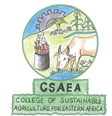Craft Certificate in Sustainable Ecological Agriculture
Why take the course?
The course will give the trainees hands-on and sound technical knowledge and skills in SEA with the intellectual capacity to handle current issues facing agriculture within Eastern Africa region.
After the training one can opt any of the following paths; can become: – Farm manager, Extension officer, Researcher, Entrepreneur or Community Development Professional.
The Craft Certificate in Sustainable Ecological Agriculture is packaged in two modules namely:
- Craft Certificate in Sustainable Ecological Agriculture and Module I
- Craft Certificate in Sustainable Ecological Agriculture Module II
CBC implementation.
Implementation of the Competence Based Curriculum (CBC) is being carried out in collaboration with Visiting Tutors from the Alabama Agricultural and Mechanical University (AAMU)-USA
The curriculum is designed to provide the graduates with both a vertical and a horizontal career growth pattern based on the CBC model.
Practicals
During training, Attachment will be undertaken within SACDEP Kenya’s projects areas in the 14 counties where the organization implements community projects. In addition, its network partner organizations in Kenya, East and Southern Africa will provide other avenues for attachment and exchange visits.
Entry Requirements
At least 1-year formal training course with a minimum of a certificate in either of the following areas: –
General Agriculture, Livestock (husbandry, management and health), Horticulture, Natural Resource Management and Agribusiness management.
A trainee entering this course should have any of the following minimum requirements:
- Passed Kenya Certificate of Secondary Education (KCSE) with a minimum mean grade of D (Plain)OR
- Equivalent qualifications as approved by the Kenya National Examinations Council (KNEC)
Duration of the Course
The course is designed to have 1980 hours. The trainee spends 1650 hours in the institution and 330 hours in industrial attachment. The course is structured in TWO Modules as outlined below:
| Institution Time Allocation in Hours | Industrial Attachment Time Allocation in Hours | Total Time Allocation in Hours | |
| Module I | 901 | 330 | 1231 |
| Module II | 749 | – | 749 |
| Total | 1650 | 1980 |
Examination Body
The assessment of all the modules shall be competency based.
There will be both internal assessment as well as external assessment. External exams will be administered by the Kenya national examination council (KNEC)
While Proficiency and short courses will be supervised by the National Industrial Training Authority (NITA)
Module 1
- Entrepreneurship
- Mathematics
- Science
- Safety And Health In Agriculture
- Foundations Of Sustainable Agriculture
- Foundation Of Organic Agriculture Production
- Principles And Practices Of Crop Production
- Seed Production
- Soil Science
- Principles And Practices Of Livestock Production – I
- Industrial Attachment
Module 2
- Communication Skills
- Life Skills
- Principles of Livestock Production – II
- Appropriate Technology for Sustainable Ecological Agriculture
- Agricultural Economics and Farm Management
- Agricultural Value Addition
- Agricultural Extension
- Business Plan
- Trade Project
Partial sponsorship up to 70% of the total fee per trimester will be offered to students as indicated below.
PARTIAL SPONSORSHIP
SACDEP-Kenya works with development partners around the world. This has enabled CSAEA secure like-minded Partners willing to provide fund opportunities for trainees through partial support as indicated.
FULL BOARD AND TUITION
| Item | Total fee per trimester (Kshs) | Percentage partial sponsorship | Payable fee per trimester (Kshs) |
| Tuition | 28,100 | 70% | 8,430.00 |
| Full board | 26,000 | 70% | 7,800.00 |
| Amount | 54,100 | Equivalent to Ksh. 37,870 | 16,230.00 |
| Full Total fee | Total payable 81,150.00 in 2 years |
NB: KNEC Examination fee is paid separately as stipulated by Kenya National Examination Council
Qualification
After successful completion of the entire course, trainees will be awarded a Certificate in Sustainable Ecological Agriculture by KNEC in collaboration with CSAEA
